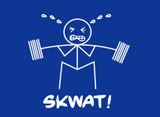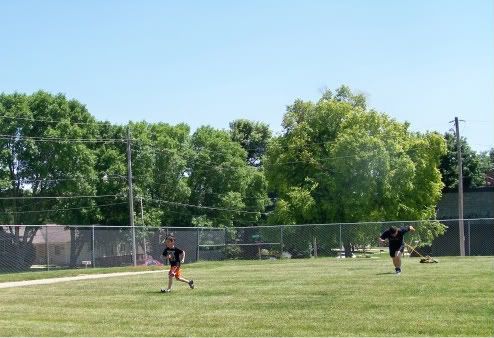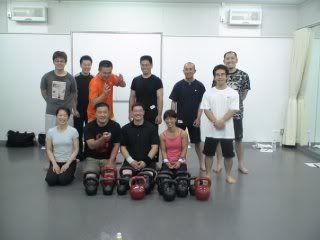I went to the Krieg website and was very impressed to see that they have custom chalk bags for $23 + $3 shipping & handling. Very, very cool stuff.






"Helping someone else is the best way to ensure your own survival. It takes you out of yourself. It helps you to rise above your fears. Now you're a rescuer, not a victim. And seeing how your leadership and skill buoy others up gives you more focus and energy to persevere. The cycle reinforces itself: You buoy them up, and their response buoys you up. Many people who survive alone report that they were doing it for someone else (a wife, boyfriend, mother, son) back home."
- from Deep Survival(pp. 180-181)
"There was a leper who lived in the forest and suffered from terrible pain and itching. The only way he could relieve himself was to dig a huge hole, fill it with burning wood - thereby creating hot charcoal - and rub his afflicted body against the charcoal. He could only get relief by creating another kind of suffering.
The story goes that he was cured and moved to the city to lead a normal life. Sometime later he had occasion to return to the forest, and there he saw lepers relieving himself as he had once done, rubbing themselves against hot charcoal. He couldn't watch. It was just too painful.
...In order to relieve ourselves from one suffering - our yearning - we create another, with all the things we run after to relieve it. A healthy person who has gotten over the illness we suffer from, finds it painful to watch us, putting ourselves through all this suffering in the hope of relieving suffering.
If this doesn't sound right to you - if it doesn't seem that desire is suffering - then there's no problem. Just go around desiring things and trying to satisfy yourself the way everyone else does. Our culture is built around that activity. We have the greatest consumer culture in the world. We create more and more things to do, better this and better that. We don't, however, seem to get happier and happier."
- Larry Rosenberg, ("Breath by Breath")
"Lean into a problem; lean so far that you might just lean right through it."
- Seth Godin ("The Dip")

"It does not matter how slowly you go, so long as you do not stop."
- Confucius





'Unlike any other organism in history, humans have a mind-body conflict: we have a body built for performance, but a brain that's always looking for efficiency.' We live or die by our endurance, but remember: endurance is all about conserving energy, and that's the brain's department. 'The reason some people use their genetic gift for running and others don't is because the brain is a bargain shopper.'
For millions of years, we lived in a world without cops, cabs, or Domino's Pizza; we relied on our legs for safety, food, and transportation, and it wasn't as if you could count on one job ending before the next one began. Look at !Nate's wild hunt with Louis; !Nate sure wasn't planning on a fast 10K immediately after a half-day hike and a high-speed hunt, but he still found the reserve energy to save Louis's life. Nor could his ancestors ever be sure that they wouldn't become food right after catching some; the antelope they'd chased since dawn could attract fiercer animals, forcing the hunters to drop lunch and run for their lives. The only way to survive was to leave something in the tank - and that's where the brain comes in.
'The brain is always scheming to reduce costs, get more for less, store energy and have it ready for an emergency,' Bramble expained. 'You've got this fancy machine, and it's controlled by a pilot who's thinking 'Okay, how can I run this baby without using any fuel?' You and I know how good running feels because we've made a habit of it.' But lose the habit, and the loudest voice in your ear is your ancient survival instinct urging you to relax. And there's the bitter irony: our fantastic endurance gave our brain the food it needed to grow, and now our brain is undermining our endurance.
'We live in a culture that sees extreme exercise as crazy,' Dr. Bramble says, 'because that's what our brain tells us: why fire up the machine if you don't have to?'
- Born To Run (pp. 242-243)
"Believe In Yourself, Trust The Process, Change Forever."
- Bob
"For whosoever hath, to him shall be given, and he shall have more abundance: but whosoever hath not, from him shall be taken away even that he hath."
- The Book of Matthew
"Real composure and real effectiveness at work come from being completely responsible and taking full ownership of everything you do. At the same time your heart is open and responsive. You are not easily knocked off center or fooled by your habits or narrow ideas. You are clear about your purpose, and at the same time you are not grasping for results."
- Marc Lesser (ZBA: Zen for Business Administration)

"Some people find it easy to be happy and others don't, even though they have plenty of conditions for happiness. You can buy conditions for happiness, but you can't buy happiness. It's like playing tennis. You can't buy the joy of playing tennis at a store. You can buy the ball and the racket, but you can't buy the joy of playing. To experience the joy of tennis, you have to learn, to train yourself to play. It's the same with writing calligraphy. You can buy the ink, the rice paper, the brush, but if you don't cultivate the art of calligraphy, you can't do calligraphy. So calligraphy requires practice, and you have to train yourself. You are happy as a calligrapher only when you have the capacity to do calligraphy. Happiness is also like that. You have to cultivate happiness; you cannot buy it at the store."
- Thich Nhat Hanh ("The Art of Power")
Did you know 21 year olds...
*...have watched 20,000 hours of TV
*...played 10,000 hours of video games
*...talked 10,000 hours on the phone
*...and they've sent/received 250.000 emails or instant messages

"Naughty, Naughty Speed"
Consider what we learn when we're taught the basics of right and wrong, prudent and imprudent. Even though speed is vital for success and can help us achieve great things, fast is rarely portrayed as noble, responsible, or smart. Often, it is characterized as reckless, naughty, and impatient. Wanting things fast means wanting immediate gratification, and immediate gratification is often judged as immature and irresponsible, even morally wrong. It's equated with impatience, short attention spans, and childish gimme-gimme attitudes.
Even the seemingly innocent Aesop's fable "The Tortoise and The Hare" whispers of speed's destructive potential. The moral of the story is most commonly given as "Slow and steady wins the race," with the emphasis on the dependability of slow. But like many of our societal judgements of speed, the key message of "The Tortoise and The Hare" is misguided. "Slow and steady wins the race" is a false claim based on a very limited interpretation of the story's plot.
Think about it: A tortoise and a hare agree to a race, and the hare scoots away as fast as he can go, leaving the tortoise in his dust. (Why does that tortoise think it's a good idea to race a hare, anyway?) But the hare is so sure the tortoise can't catch up that he stops to snack on grass and have a nap before bothering to actually complete the race. When he wakes, he sprints for the finish line. But as he dashes across, smug and sure of his victory, he finds the tortoise on the other side, patiently awaiting his arrival.
The hare doesn't lose because he's fast - speed does not work against him in any way. And the tortoise doesn't win because he is slow. The hare loses because he makes a ridiculous choice about how to spend his time, because he is irresponsible and arrogant enough to declare victory before he has finished. And the tortoise wins because he is brave enough to enter a race when the odds are stacked against him and persistent enough to make it all the way to the finish line without giving up or losing focus.
Speed's role in the fable is to exaggerate the lesson, to illustrate that even with a dramatic natural advantage - in the hare's case, speed - one must stay focused and resist underestimating the competition to win. On the flip side, one can race against unlikely odds if she is humble, courageous, determined, and focused. Speed isn't at fault in the hare's loss, and slowness is certainly not what won the race for the tortoise. Yet generations of readers and listeners have come away with the idea that slow is smart and fast is irresponsible.
It's true that the ability to delay gratification is one of the signs of maturity as children develop. But having mastered the skill of delaying gratification when we need to, why should we delay it on principle, for no extra benefit? And although there are some situations in which we will benefit from delaying gratification (more on that later), there's no need to dismiss it automatically as irresponsible or immature. Why do we believe that waiting for our reward is so noble? The "childish" impulse to have what you want when you want it is really no different from the reluctance to use snail mail when you can send email, to take the slow train when there's a fast one, and to beat around the bush when you want to get to the point.
But the lessons we're taught are confusing. For every story like "The Tortoise and The Hare," for every pithy quote that villifies speed ("Haste makes waste," "Rome wasn't built in a day"), there seems to be another aphorism, another lesson, that glorifies or encourages it ("A stitch in time saves nine," "He who hesitates is lost"). And while some aspects of speed make us instinctively recoil, we're quite attracted to others.
From "The Age of Speed" by Vince Poscente (pp. 33-37)



1) Pick a target
2) Reach for it
3) Evaluate the gap between the target and the reach
4) Return to step one

"Recovery doesn't come in a can. Recovery is sleep."
- Dan John








"I don't get it! I did 5 sets of 5 with 300, so I'm SUPPOSED TO be able to lift 400lbs."
"I've only eaten 3000 calories this week, so WHY haven't I lost weight?"
"I don't smoke, drink, or do drugs. I SHOULD be healthy."
"I haven't had a day off in months. I DESERVE a vacation."
"I've trained hard for the past three weeks. I've EARNED this pie."

The arms are straight, and the bar lies in the fingers, like it is holding a hook. Thumb should be overlapping one or two of the first two fingers.
The bar should "not" be squeezed. Rather, it should just lay in the fingers/hand. Only the thumb should be flexed, or squeezed, not the hands, not the forearm. If this is done incorrectly, most likely, the bar on a very hard pull will slip out of the hands. Also if the hands are rotated as you grip the bar, it will most likely slip out as the weight pulls down, and pulls the rotated hands back to a straight up and down position. One does not have to have a strong grip to hold onto large amounts of weight. I have a very poor grip and grip strength and have never lost a deadlift, i.e. 716 at 165lbs.
"In theory, there's no difference between theory and practice: in practice, there is."
- Yogi Berra





